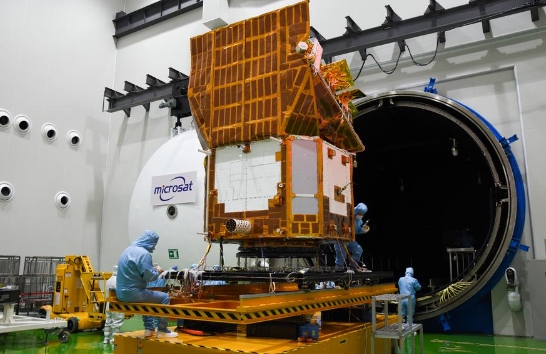China vows enhanced international cooperation in space science exploration

Researchers conduct an experiment for a satellite named Einstein Probe at the Innovation Academy for Microsatellites of the Chinese Academy of Sciences (CAS) in Shanghai, east China, July 20, 2023.(Innovation Academy for Microsatellites of CAS/Handout via Xinhua)
China will pursue extensive and in-depth international cooperation in space exploration, according to a press conference held on Tuesday unveiling the nation's mid and long-term space science development program.
Wang Chi, director of the National Space Science Center under the Chinese Academy of Sciences, said that international cooperation in space science can significantly multiply scientific output and foster mutual understanding and friendship among countries worldwide.
Wang cited the development of the Solar wind Magnetosphere Ionosphere Link Explorer satellite as an example of the comprehensive collaboration between China and Europe, from its development to its operation.
The establishment of multinational collaborative scientific teams with complementary advantages will be encouraged in space science projects, and the sharing of scientific data will be expanded to promote significant scientific achievements, Wang said.
Such international collaborations have been established in space science missions like the Advanced Space-based Solar Observatory and the Einstein Probe.
According to Yang Xiaoyu, director of the Department of System Engineering of the China National Space Administration, China has signed cooperation agreements with 17 countries and international organizations on the construction of the International Lunar Research Station (ILRS) initiated by China, offering various levels and forms of collaboration opportunities.
"We will engage in extensive cooperation in areas such as joint verification, design and implementation of overall tasks, as well as scientific data sharing in the ILRS program," Yang said.
Yang also emphasized the role of space science and technology in promoting the growth of developing countries when responding to a media inquiry.
He said that China, as the largest developing country, deeply understands the numerous challenges that developing countries face regarding survival and development. "Having gone through similar experiences, China recognizes the crucial role of space technology in overcoming these challenges."
Yang added that China has been actively engaged in extensive cooperation with global partners in space initiatives, particularly by helping developing countries enhance their space technologies and capabilities in tackling climate change, protecting the environment, and preventing and mitigating disasters.
"This support aims to improve people's livelihoods, promote economic and social development, and foster sustainable progress," Yang said.
Editor:伏娅敏
